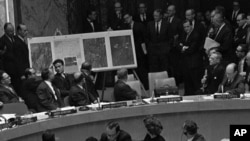Historians agree that in October of 1962, U.S. President John F. Kennedy and Soviet leader Nikita Khrushchev squared off in a showdown that brought the world to the brink of nuclear war.
Sergei Khrushchev, son of the Soviet leader and a professor at Brown University, says the crisis was ultimately resolved peacefully because both leaders were rational men.
“We were very lucky that the two leaders were balanced and reasonable and their policy was not shoot first then think, but first think, then, second time, think and maybe don’t shoot at all,” he said.
Shortly after the missile crisis, Kennedy and Khrushchev established a “hotline” between Washington and Moscow providing for direct communications between the White House and the Kremlin. It is in operation to this day. The two men also signed a test ban treaty, ending nuclear testing everywhere but underground.
“But then Kennedy was assassinated, then Khrushchev was ousted from power,” said Professor Khrushchev. “I think that if these two leaders would have been in power longer, it is a big possibility that the Cold War would have been over. But history decided in a different way and we returned to the Cold War and all this crazy arms race until the Gorbachev time,” he said.
Experts such as Graham Allison of Harvard University say there are lessons to be learned from the crisis, which even President Kennedy admitted.
“(Kennedy said) the lesson out of this is that we have to avert crises that lead to confrontations in which an adversary has to choose between humiliating retreat and war,” said Allison, adding that President Barack Obama is facing a similar situation with Iran’s suspected nuclear weapons program, which Allison calls a “Cuban Missile Crisis in slow motion.”
“The president is going to be faced with an option between acquiescing in Iran acquiring a nuclear bomb — that’s one option,” he said. “Or alternatively, attacking Iran to prevent it acquiring a nuclear bomb — so attack or acquiesce.
“The implication of that for where we stand with Iran today is, if you look at attacking Iran and the consequences of that, they look pretty ugly,” he said. “And if you look at acquiescing to Iran becoming a nuclear-weapon state and the consequences that will have in the very volatile region of the Middle East — and likely trigger further proliferation in other states like Saudi Arabia — that looks pretty ugly.”
Allison said the U.S. administration must search for a third option, as did President Kennedy during the Cuban Missile Crisis.
“I would hope that immediately after the election, the U.S. government will also turn intensely to the search for something that’s not very good — because it won’t be very good — but that is significantly better than attacking on the one hand or acquiescing on the other,” he said.
For his part, Professor Khrushchev favors dialogue.
“We have to negotiate with Iran, not threatening them with different sanctions, but negotiate on the highest level, American president with Iranian president," said the professor. "And I don’t think that President Kennedy loved Khrushchev more than President Obama loves President Ahmadinejad, but they understood — Kennedy and Eisenhower — that you have to talk with them, because if you are talking with your enemy, you can influence them and you can better understand them.”
If the Iranian crisis cannot be resolved peacefully and it comes to war, says Professor Khrushchev, the United States would win. But, asks the son of the former Soviet leader, at what price?








